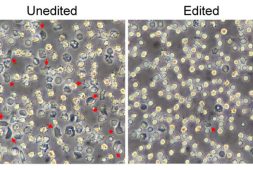
Navigate through the aisle dedicated to cold remedies in nearly any pharmacy, and you’ll encounter a display stocked with various zinc supplements. Evidently, there is a prevalent concern among people about their zinc intake, as the nutrient is frequently promoted for its potential to combat the common cold and other respiratory ailments. However, is there a widespread need for increased zinc consumption among us? If so, what benefits does it bring?
As scientists delve deeper into understanding the utilization of zinc in our bodies, they are discovering its unexpectedly crucial role, especially within the immune system. “We think zinc is a gatekeeper of immune function,” says Lothar Rink. He is an immunologist at RWTH Aachen University in Germany and he also recently coauthored an overview of zinc’s roles in the immune system in the 2021 Annual Review of Nutrition.
While scientists continue to grapple with the challenge of accurately measuring zinc levels in the body, it appears that a significant number of individuals may indeed be lacking sufficient zinc in their diets—an essential component for optimal immune function.
Inadequate zinc intake poses a clear threat to one’s health. Severe deficiencies, often stemming from genetic issues or extremely restricted diets, can lead to various complications, including stunted growth in infants and children, hair loss, roughened skin, delayed wound healing, and compromised defenses against infections.
However, understanding the scope and implications of more subtle zinc deficiencies has proven to be elusive. This difficulty arises mainly from the intricate dynamics of zinc movement within and outside our cells. For instance, during an infection, blood zinc levels may decrease as the mineral is redirected from the bloodstream to cells involved in initiating an immune response. Additionally, factors such as diet, specific medications, hormones, and overall health can perturb zinc levels.
Due to these complexities, the precise measurement of zinc levels in people remains a formidable challenge. Unlike iron, which can be easily assessed by examining levels of iron-containing blood proteins like hemoglobin and ferritin, there is no biomarker available to serve as a reliable indicator of zinc levels. Consequently, while it is feasible to detect zinc levels in the blood, such measurements often lack precision.
“There’s still no 100 percent accurate way to measure zinc in a human being, especially if they have an illness of some kind,” says Daren Knoell. He is a zinc biologist at the University of Nebraska.
He mentioned that presently, the most effective method for identifying a possible zinc deficiency is to examine an individual’s dietary intake.

Inadequate intake of zinc in one’s diet is the primary reason for zinc deficiency. However, certain groups may face an increased risk of deficiency due to elevated nutritional needs, such as during pregnancy, or as a result of conditions that impact the body’s ability to absorb the mineral, such as Crohn’s disease and other gastrointestinal disorders.
Due to these challenges, physicians typically diagnose zinc deficiency when patients exhibit significant symptoms of deficiency, such as rough skin or hair loss, according to Rink. “But immune deficiency takes place much earlier, when you have a slight zinc deficiency.” Scientists have discovered that individuals lacking sufficient zinc are more susceptible to infections compared to those with adequate mineral levels. In the case of healthy elderly individuals, research indicates that the frequency of infections can be reduced through the use of zinc supplements. While there is ongoing investigation into the potential use of zinc supplements to prevent Covid-19, the U.S. National Institutes of Health caution that current evidence is insufficient to determine its effectiveness.
To enhance the identification of individuals with insufficient zinc intake, Rink is actively participating in a project focused on assisting both clinicians and the general public in evaluating an individual’s zinc status. The initiative involves utilizing a mobile app to meticulously monitor dietary habits and supplement usage.
Current data suggests that zinc deficiency is prevalent. Through assessments of diet and the occurrence of stunted growth, a consequence of insufficient zinc intake during development, some studies estimate that approximately 17 percent of the global population is susceptible to zinc deficiency. In specific low- and middle-income regions, such as parts of South Asia, this proportion can be as high as 30 percent.
Factors like aging, genetics, pregnancy, illness, and others contribute to this deficiency, with diet being the primary culprit. Inadequate consumption of zinc-rich foods like seafood, red meat, and nuts is a key factor. Additionally, the consumption of excessive phytates found in whole-grain bread, cereals, and other sources can pose a problem. Phytates bind to zinc, preventing its absorption into the body.
Even in the United States, a 2020 assessment of over 26,000 adults conducted by a supplement company revealed that about 15 percent of the population lacks sufficient levels of zinc in their diet. This deficiency, particularly common among the elderly due to poor dietary habits, often goes unnoticed as most individuals do not display outward signs of being zinc-deficient, according to Knoell.
“But when things go wrong — you get an infection — odds are, you’re going to do worse than somebody who has sufficient amounts of zinc in their diet.”

Zinc is found in a variety of foods, with oysters, crab, and beef ranking among the top sources of this mineral. While phytates, compounds that can hinder zinc absorption, are commonly found in plants, plant-based foods like pumpkin seeds and oatmeal can still serve as valuable zinc sources.
Zinc and Its Benefits
Research indicates the significance of zinc in nearly every facet of the immune system. Zinc plays a crucial role in enabling skin cells and cells lining our organs to resist the entry of pathogens. Additionally, it maintains the normal functioning of the thymus and bone marrow, essential for the production of immune cells. Zinc “crops up in all parts of the immune system,” says Sophie Hambleton. She is an immunologist at Newcastle University in the UK. Moreover, people who are zinc-deficient demonstrate several immune dysfunctions.
To date, the majority of research has concentrated on examining the role of zinc in the innate immune system, the initial line of defense that swiftly mounts non-specific attacks against foreign invaders. Zinc seems to play a crucial role in fortifying physical barriers, such as the protective cells lining our organs, and ensuring the optimal functioning of macrophages, essential white blood cells responsible for engulfing pathogens and releasing chemical signals to recruit other immune cells.
To guarantee an ample supply of zinc for these diverse tasks, the body tightly regulates mineral concentrations. For instance, during an infection, immune cells like macrophages swiftly generate a zinc-transporting protein known as ZIP8. This protein governs the influx of zinc into the cells, a critical factor in maintaining their ability to combat pathogens and regulating the production of vital defense-related molecules, including cytokines, as discovered by Knoell and colleagues.
Recent investigations have shed light on zinc’s significance in the adaptive immune system as well. The adaptive immune system relies on the recollection of past threats to mount targeted attacks through antibodies and T cells. In 2019, Hambleton and her team reported that a mutation in another zinc transporter, ZIP7, led to a condition where patients lacked B cells, the immune cells responsible for continuous antibody production. Further studies in mice with similar mutations indicated that ZIP7 deficiency diminished zinc concentrations in immature B cells, hindering their maturation.
While the broader implications of ZIP7 defects in individuals without this mutation remain uncertain, Hambleton suggests that a ZIP7 malfunction could be one mechanism by which an overall zinc deficiency might contribute to immune function issues.
Amount of Zinc Per Person
Given the crucial role of zinc in maintaining a robust immune system and the challenges associated with identifying potential deficiencies in individuals, Rink suggests that supplementing with zinc is likely a prudent choice. This is especially relevant for individuals at a higher risk of deficiency, such as vegetarians, vegans, and the elderly. (It’s worth noting that Rink has affiliations with three companies that sell zinc supplements.)
The majority of zinc nutritional supplements are considered safe, causing no serious side effects when adhering to the recommended daily intake of 8 milligrams for women and 11 milligrams for men. However, Rink emphasizes the importance of caution at very high concentrations, as excessive zinc levels can lead to adverse effects. For instance, in 2009, the US Food and Drug Administration issued a warning against Zicam nasal spray and swabs, a common cold remedy with excessively high zinc levels, resulting in a loss of the sense of smell. Due to potential risks, experts advise that adults should not exceed a daily intake of 40 milligrams of zinc.
Over-the-counter zinc supplements are readily available in most pharmacies. While some studies suggest that supplementation may help reduce the severity and duration of respiratory infections, like the common cold, certain uncertainties persist. Questions remain regarding the optimal timing for supplement intake and whether individuals without a zinc deficiency can benefit.
Despite a scarcity of clinical trials in humans, a limited number have explored the impact of zinc supplementation during viral infections. A 2021 review of two dozen trials indicated that, in healthy individuals, taking zinc supplements in the form of lozenges or nasal sprays at the onset of illness may shorten the duration of common colds and other respiratory infections by a few days. The study also investigated chronic supplementation and found evidence suggesting that taking zinc supplements daily for seven months to a year might help mitigate the effects of respiratory infections, although it did not seem to prevent the common cold.
Hambleton adds a note of caution, emphasizing the importance of ensuring adequate zinc intake through diet. Manipulating zinc levels in specific parts of the immune system is challenging due to its varied distribution throughout the body. “It’s very simplistic to think that because zinc is required for immunity, more zinc equals more immunity,” she explained.
Numerous unanswered questions persist in this field. The authors of the 2021 review highlight limitations in the available trials, citing issues such as small sample sizes. Moreover, the timeframe for reaping the benefits of zinc remains uncertain. While most trials examining zinc’s advantages post-infection suggest that supplements are effective only within the initial 24 hours of symptom onset, the research team uncovered indications that this window might extend, with potential benefits even when consumed up to three days after symptoms emerge.
Knoell emphasized the need for improved zinc supplements, noting that the current ones, primarily in salt form like zinc sulfate or chloride, are not efficiently absorbed by the body. Additionally, the question arises about whether certain individuals may be genetically predisposed to struggle with zinc absorption. Researchers are also exploring the potential of drugs targeting zinc transporters for individuals experiencing issues with these proteins.
“We’re starting to ask and answer those questions now in animal models,” Knoell also added. “The excitement will be, of course, if some of that translates to the human condition.”



